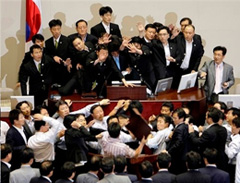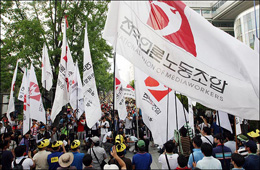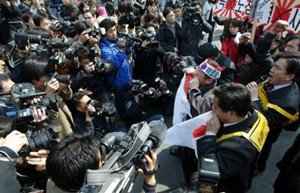Media law reform: Not just creating new jobs
For Juan Felipe López Aymes *
The new media law authorizes private corporations possess up to 10% of TV stocks, 30% of general programming providers and 30% of news channels. Prior to this norm, electronic media used to operate under an investment scheme according to which it enjoyed a special protection from governmental control ambitions. The reason was to avoid the use of media with any other than social-oriented goals. When the law was being drafted, conservative lawmakers quarreled fiercely against their progressive counterparts. After a long and frustrating negotiation process, the Korean National Assembly passed it as a law. Some of those give and take difficulties had to do with media content and media access. It was, however, a dead-end: the Korean Democratic Party was not going to accept the Korean establishment got also in command of the media.
 It is indeed interesting to analyze the way in which the media law got changed. That can be done from different perspectives. The first one is basically from the economics. To widen the financial sources through private investment on the e-media sounds, seemingly, as an attractive answer to the need of modernization. It could also improve the existing companies’ contents that had been protected from foreign capital (Korea is not an exception on this regard) To open the investment scheme in this sector would had, according to the law reform promoters –the ruling party- a positive impact on the job creation market and could also improve the technology logistic of Korean media. If only this economical aspect is taken into consideration, all the clatter generated by it will sound absurd. However, in Korean political economy, politics is not just important, it is vital.
It is indeed interesting to analyze the way in which the media law got changed. That can be done from different perspectives. The first one is basically from the economics. To widen the financial sources through private investment on the e-media sounds, seemingly, as an attractive answer to the need of modernization. It could also improve the existing companies’ contents that had been protected from foreign capital (Korea is not an exception on this regard) To open the investment scheme in this sector would had, according to the law reform promoters –the ruling party- a positive impact on the job creation market and could also improve the technology logistic of Korean media. If only this economical aspect is taken into consideration, all the clatter generated by it will sound absurd. However, in Korean political economy, politics is not just important, it is vital.
On the political aspect there are several points. First, the Grand Nation Party, the ruling political party, has majority at the Korean legislative. That provides a considerable leverage on the reform initiatives that President Lee Myung-bak wants to lead. Lee represents a conservative line which supports industrial conglomerates (he owes his professional career to one of those corporations: Hyundai). Second, just before the law passed, the GNP had approved several reforms, granting the industrial companies (not the financial ones) access to actually invest on certain sectors that had been historically banned. For instance, industrial corporations could not own commercial banks nor could they possess stock shares that allow them to control the so-called strategic industries as steel and telecommunications among others. From the nineties, these restrictions were gradually eased. The strategic fields had been protected not only from foreign ownership but also from the big family-run conglomarates. The basic goal behind this reasoning was avoiding capital concentration that could lead to distortions in the economy and, even worse, greater risks for predatory practices and the so-called moral risk.
 To enlighten this last point, one should consider two examples: if the industries acquire Banks, they could hardly oversee the intra-group credit lines with certain objectivity. Then, if conglomerates that already possess their own newspapers could also buy e-media companies, access to information would be at stake. In both cases, extremes in property are equally noxious to the system and to democracy. As the press controlled by the government (that is under the State’s name) as by the economic power cannot lead to any positive ending. Furthermore, reforms benefits as job creation and technology modernization would be overshadowed by the conglomerates’ conservative interests and commercial ambitions.
To enlighten this last point, one should consider two examples: if the industries acquire Banks, they could hardly oversee the intra-group credit lines with certain objectivity. Then, if conglomerates that already possess their own newspapers could also buy e-media companies, access to information would be at stake. In both cases, extremes in property are equally noxious to the system and to democracy. As the press controlled by the government (that is under the State’s name) as by the economic power cannot lead to any positive ending. Furthermore, reforms benefits as job creation and technology modernization would be overshadowed by the conglomerates’ conservative interests and commercial ambitions.
In other words, the commercial Banks acquisition by international speculators and other private financial institutions right after the 1997 economic crisis brought a new credit dynamic according to which consumption, capital creation and more productive industrial projects were severely damaged. As a negative aspect, the credit bubble that was created had a fatidic outcome to the Korean families’ management of resources (originally fascinated by the chance of buying with nor money nor remorsefulness).
A third political aspect is the confrontation between the progressive Democratic Party and the conservative GNP. Before ex President Roh Moo-hyun’s death, last May, it would seem as if the GNP was obtaining important reforms with the opposition groups at the National Assembly. However, incidents that occurred before and after Roh’s suicide have driven to legislative paralysis and radicalization of both contending factions. Then, they could not reach an agreement on the legislative commissions to pass the reforms with the required consensus. That is the reason why the media reform required the Korean National Assembly plenary, where the GNP has the majority of the benches, to pass the law. As it is said in Mexico, the opposition has been “majoritated”. The GNP representatives only got to physically enter to the building which they achieved thanks to violent pushes and literary jumping human obstacles that were blocking the entrances but one. What remains is just part of the political folklore.
 The Korean conglomerates, known as chaebols, are big diversified companies that have concentrated the country’s wealth. In the sixties and seventies the government itself promoted their creation and proliferation constituting a foundation in the industrialization and modernization process. Thanks to this enterprise, South Korea is today among the first more powerful economies in the world. For a country that had suffered extreme poverty and the destruction of a fratricidal war that is especially remarkable. Nonetheless, the chaebols are today powerful and financially independent agents. Traditionally, they had suffered limitations to their expansion capabilities based on the notion of strategic sectors that had to be protected by the State. Due to international pressures and ideological mattes, the economic and legal barriers had gradually been softened giving the conglomerates greater margins of maneuver. The new media law is one more of these norms that tend to adequate what the Korean government interprets as a need imposed by the international community in the actual financial crisis context. Under the government’s supervision, these reforms are viewed as a way to deal with current troubles. Liberalization is conceived as a remedy to improve competitiveness in diverse sectors of the Korean economy.
The Korean conglomerates, known as chaebols, are big diversified companies that have concentrated the country’s wealth. In the sixties and seventies the government itself promoted their creation and proliferation constituting a foundation in the industrialization and modernization process. Thanks to this enterprise, South Korea is today among the first more powerful economies in the world. For a country that had suffered extreme poverty and the destruction of a fratricidal war that is especially remarkable. Nonetheless, the chaebols are today powerful and financially independent agents. Traditionally, they had suffered limitations to their expansion capabilities based on the notion of strategic sectors that had to be protected by the State. Due to international pressures and ideological mattes, the economic and legal barriers had gradually been softened giving the conglomerates greater margins of maneuver. The new media law is one more of these norms that tend to adequate what the Korean government interprets as a need imposed by the international community in the actual financial crisis context. Under the government’s supervision, these reforms are viewed as a way to deal with current troubles. Liberalization is conceived as a remedy to improve competitiveness in diverse sectors of the Korean economy.
What occurred at the Korean legislative is surely a reflex in the way political economy is understood in South Korea. In such reasoning, economic power is gaining more influence and control spaces. Meanwhile, the current administration troubled by structural and ideological limitations suffers the impact of the international financial turmoil. It surely does not intend to establish itself as an impartial mediator in the economical and political dispute.




